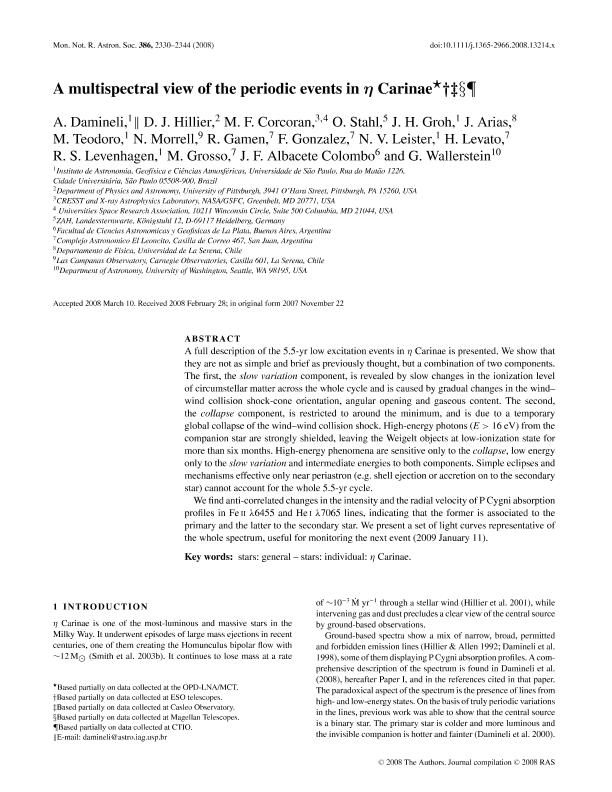Mostrar el registro sencillo del ítem
dc.contributor.author
Damineli, A.
dc.contributor.author
Hillier, D. J.
dc.contributor.author
Corcoran, Michael

dc.contributor.author
Stahl, O.
dc.contributor.author
Groh, J. H.
dc.contributor.author
Arias, Julia Ines

dc.contributor.author
Teodoro, M.
dc.contributor.author
Morrell, Nidia Irene

dc.contributor.author
Gamen, Roberto Claudio

dc.contributor.author
Gonzalez, Jorge Federico

dc.contributor.author
Leister, N. V.
dc.contributor.author
Levato, Orlando Hugo

dc.contributor.author
Levenhagen, R. S.
dc.contributor.author
Grosso, Monica Gladys

dc.contributor.author
Albacete Colombo, Juan Facundo

dc.contributor.author
Wallerstein, G.
dc.date.available
2018-05-04T13:38:33Z
dc.date.issued
2008-06
dc.identifier.citation
Damineli, A.; Hillier, D. J.; Corcoran, Michael; Stahl, O.; Groh, J. H.; et al.; A multispectral view of the periodic events in Eta Carinae; Wiley Blackwell Publishing, Inc; Monthly Notices of the Royal Astronomical Society; 386; 4; 6-2008; 2330-2344
dc.identifier.issn
0035-8711
dc.identifier.uri
http://hdl.handle.net/11336/44112
dc.description.abstract
A full description of the 5.5-yr low excitation events in η Carinae is presented. We show that they are not as simple and brief as previously thought, but a combination of two components. The first, the slow variation component, is revealed by slow changes in the ionization level of circumstellar matter across the whole cycle and is caused by gradual changes in the wind– wind collision shock-cone orientation, angular opening and gaseous content. The second, the collapse component, is restricted to around the minimum, and is due to a temporary global collapse of the wind–wind collision shock. High-energy photons (E > 16 eV) from the companion star are strongly shielded, leaving the Weigelt objects at low-ionization state for more than six months. High-energy phenomena are sensitive only to the collapse, low energy only to the slow variation and intermediate energies to both components. Simple eclipses and mechanisms effective only near periastron (e.g. shell ejection or accretion on to the secondary star) cannot account for the whole 5.5-yr cycle. We find anti-correlated changes in the intensity and the radial velocity of P Cygni absorption profiles in Fe II λ6455 and He I λ7065 lines, indicating that the former is associated to the primary and the latter to the secondary star. We present a set of light curves representative of the whole spectrum, useful for monitoring the next event (2009 January 11).
dc.format
application/pdf
dc.language.iso
eng
dc.publisher
Wiley Blackwell Publishing, Inc

dc.rights
info:eu-repo/semantics/openAccess
dc.rights.uri
https://creativecommons.org/licenses/by-nc-sa/2.5/ar/
dc.subject
Stars
dc.subject
Eta Carinae
dc.subject.classification
Astronomía

dc.subject.classification
Ciencias Físicas

dc.subject.classification
CIENCIAS NATURALES Y EXACTAS

dc.title
A multispectral view of the periodic events in Eta Carinae
dc.type
info:eu-repo/semantics/article
dc.type
info:ar-repo/semantics/artículo
dc.type
info:eu-repo/semantics/publishedVersion
dc.date.updated
2018-04-23T15:35:42Z
dc.journal.volume
386
dc.journal.number
4
dc.journal.pagination
2330-2344
dc.journal.pais
Reino Unido

dc.journal.ciudad
Londres
dc.description.fil
Fil: Damineli, A.. Universidade de Sao Paulo; Brasil
dc.description.fil
Fil: Hillier, D. J.. University of Pittsburgh; Estados Unidos
dc.description.fil
Fil: Corcoran, Michael. CRESST and X-ray Astrophysics Laboratory; Estados Unidos
dc.description.fil
Fil: Stahl, O.. Zentrum für Astronomie. Landessternwarte; Alemania
dc.description.fil
Fil: Groh, J. H.. Universidade de Sao Paulo; Brasil
dc.description.fil
Fil: Arias, Julia Ines. Univerisad de La Serena; Chile
dc.description.fil
Fil: Teodoro, M.. Universidade de Sao Paulo; Brasil
dc.description.fil
Fil: Morrell, Nidia Irene. Las Campanas Observatory; Chile
dc.description.fil
Fil: Gamen, Roberto Claudio. Consejo Nacional de Investigaciones Científicas y Técnicas. Centro Científico Tecnológico Conicet - San Juan. Complejo Astronómico ; Argentina
dc.description.fil
Fil: Gonzalez, Jorge Federico. Consejo Nacional de Investigaciones Científicas y Técnicas. Centro Científico Tecnológico Conicet - San Juan. Complejo Astronómico ; Argentina
dc.description.fil
Fil: Leister, N. V.. Universidade de Sao Paulo; Brasil
dc.description.fil
Fil: Levato, Orlando Hugo. Consejo Nacional de Investigaciones Científicas y Técnicas. Centro Científico Tecnológico Conicet - San Juan. Complejo Astronómico ; Argentina
dc.description.fil
Fil: Levenhagen, R. S.. Universidade de Sao Paulo; Brasil
dc.description.fil
Fil: Grosso, Monica Gladys. Consejo Nacional de Investigaciones Científicas y Técnicas. Centro Científico Tecnológico Conicet - San Juan. Complejo Astronómico ; Argentina
dc.description.fil
Fil: Albacete Colombo, Juan Facundo. Universidad Nacional de La Plata. Facultad de Ciencias Astronómicas y Geofísicas; Argentina
dc.description.fil
Fil: Wallerstein, G.. University of Washington; Estados Unidos
dc.journal.title
Monthly Notices of the Royal Astronomical Society

dc.relation.alternativeid
info:eu-repo/semantics/altIdentifier/doi/http://dx.doi.org/10.1111/j.1365-2966.2008.13214.x
dc.relation.alternativeid
info:eu-repo/semantics/altIdentifier/url/https://academic.oup.com/mnras/article/386/4/2330/1468103
Archivos asociados
